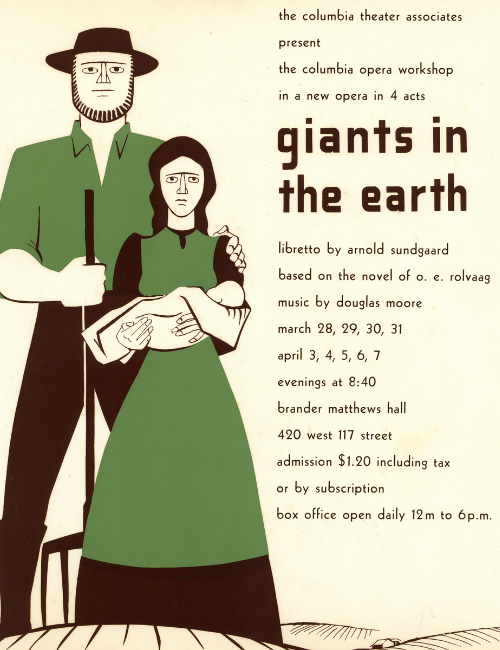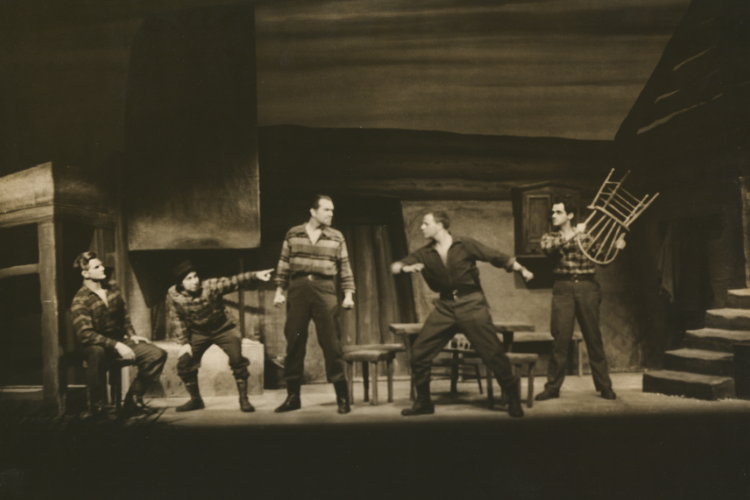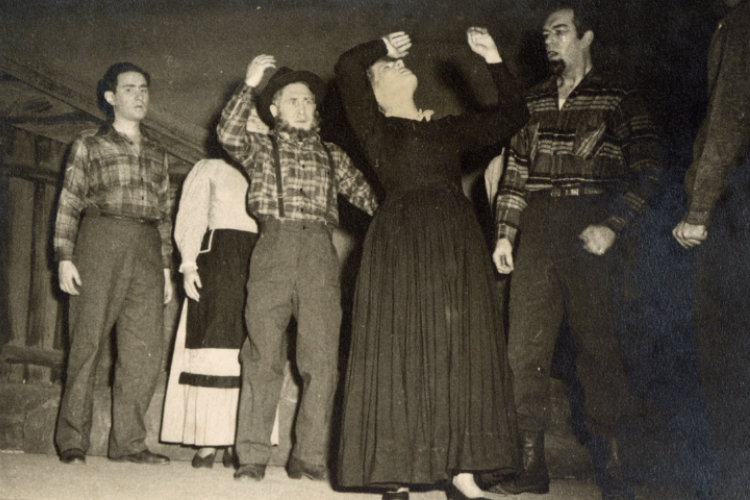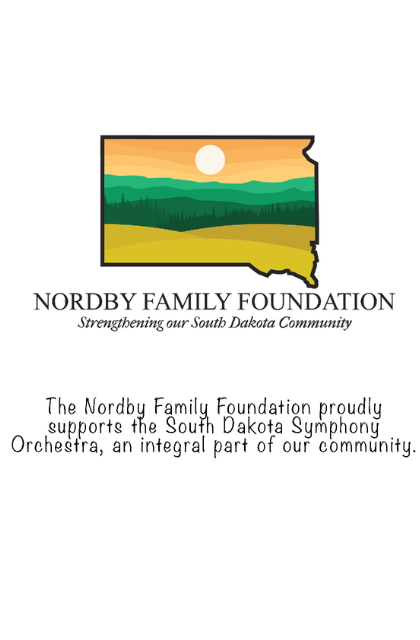A note from Music Director Delta David Gier:
Welcome to the revival performances of Douglas Moore's opera Giants in the Earth. By attending this performance you are joining us in making history by bringing this opera back to life.
In our planning, the SDSO has grappled with a certain cultural dissonance. How can we be the orchestra which developed the Lakota Music Project - which addresses racial tension in our state through the sharing of music in order to facilitate cross-cultural understanding - but also present an opera about Norwegian immigrants coming and settling on land that was once occupied by Dakota people? Through many discussions over the course of a year with partners both Native and non-Native, we came to peace with the fact that these are two very important pieces of our history, and that history is nuanced as well as complicated. The SDSO remains committed to addressing these issues honestly and diligently, striving towards the goal of inspiring the best in all of us through music.
PROGRAM NOTES
Written by Jerry McBride
Head Librarian, Emeritus, Stanford University Music Library
Background
Arnold Sundgaard (1909 - 2006), Broadway lyricist and author, recommended Giants in the Earth, by O. E. Rolvaag (1876 - 1931) to Douglas Moore as the basis for an opera libretto in 1948. Moore received the Rome Prize for composition at the American Academy in 1949, necessitating a collaboration by correspondence - a challenging working arrangement. Moore finished in 1950. He wanted a professional performance in New York at the City Center Opera or on Broadway, but the Columbia University Opera Workshop gave the premiere with professional singers in the principal roles in 1951. Shortly thereafter, the opera was awarded the Pulitzer Prize in Music.

Images courtesy of Columbia University Libraries, Rare Book & Manuscript Library
Copyright issues delayed the opera's publication for three years. By then, interest in the opera had waned, but it was revised for publication in 1963, which is the version used in this production. The only fully staged production since the premiere was by the University of North Dakota in 1974. Although many consider the Ballad of Baby Doe (1956) to be his finest opera, Moore felt that Giants in the Earth contained some of his best music.
The Opera
The drama centers on the tension between the deep love of Beret and Per Hansa and Beret's inability to adjust to harsh, lonely, pioneer life on Dakota's uninhabited, austere, bleak plains, leading her to insanity. The libretto differs from the novel in two crucial scenes. In the novel, Beret interrupts the baptism of their son, and at the end, Per and Beret's friend Hans Olsa is dying. In the opera, Beret prevents the baptism, and it is their unbaptized, child, Peder, whose immortal soul is in peril unless Per can bring back the preacher before the child's death. Both changes heighten the drama.
Beret's father's ornate chest from Norway is central to the plot and is symbolic of her attachment to family, friends, and her life in Norway with spiritual overtones. It comforts her when Per refuses to return to Norway, when her son presents a bone from a Native American gravesite, and during the plague of locusts. It serves as an altar for a wedding and a baptism. It reveals "Per's "sin" of removing the land-claim stakes hidden from her, which she finds there. It contains a prized silver coffee pot and a cross that she gives Per to protect him as he goes into the blizzard and to his death.
Moore's compositional style was fully mature when he started Giants in the Earth. He composed vocal music by starting with the text, which he would repeat to himself, letting the rhythm and inflection of the words suggest the melodic line. This accounts for the fluidity of the vocal lines and easily, understandable text. Giants in the Earth is a prime example of this method of composition, which results in little thematic repetition and short arias. These ariosos are expertly woven into the flow of a continuous melodic line similar to Debussy's Pelléas et Mélisande.
For casting, Moore assigns the lower ranges to strong characters and weaker characters to the high voices. Beret (soprano) and Per (baritone) are good examples of this dichotomy. The music is tonal except to evoke terror or tragedy, such as the final, powerfully unresolved chord at the conclusion when Beret and the audience realize she has caused Per to freeze to death in the blizzard, emphasizing the tension that steadily builds throughout.
Synopsis
Act 1
The orchestral opening establishes a sense of foreboding that returns in the last act. The Hansa family meets Hans, Kjersti, Syvert, Sorrine, and Henry, their Norwegian friends on the prairie, and they break into the Norwegian national anthem, "Ja, vi elsker ditto Landet" ("Yes, We Love This Country"). Henry looks for his girlfriend and is heartbroken that she feared the long trip because she has not arrived. Beret is intensely homesick and pleads with Per to return, but he is determined to forge a new life in this virgin land. However, Per and Hans excitedly sing a work song. Beret sits beside her father's chest in despair. Their son Ola then presents a bone from an Indian gravesite, horrifying Beret and foreshadowing the death that will be exacted from the family.
Act 2
The women have coffee while the men travel to town. Beret pulls her silver coffee pot from the chest, recalling when she and Per first met. She then discovers land-claim stakes hidden in the chest. The three women continue socializing in a trio in the form of a round. Soon, O'Hara and Sullivan appear looking for their land-claim stakes they believe should be on Hans's land. The Irishmen will return later. Beret checks the stakes in the chest and sees the name O'Hara. The Norwegian men enter and sing a waltz-time tune about the presents they bought in town. The final surprise is Henry and his new girlfriend, Dagmar, who are not yet married. The women insist on getting the preacher quickly. Alone, Beret confronts Per about the stakes. As Per explains it to her, the Irishmen return, fighting with Hans and Per, who force them off the land.

Images courtesy of Columbia University Libraries, Rare Book & Manuscript Library
After the fight, Per leaves his gift for Beret - a cradle for their soon-to-be-born child, which broke during his trip home. Nonetheless, Beret feels her husband is wrong, and the broken cradle is another bad omen.
Act 3. Scene 1
The wedding takes place with the chest as the altar and is followed by dancing that is stopped by the preacher. The group sings a hymn for the baptism of Per and Beret's child, but she interrupts, objecting to the name Peder Victorious as evil. While Per tries to calm her, she faints.

Images courtesy of Columbia University Libraries, Rare Book & Manuscript Library
Locusts arrive, which Beret interprets as divine retribution for this evil. While the settlers battle to save the crops, Beret is terrified. As the plague surges, she moves toward the chest and sinks to her knees, clutching it as Per rushes to help her.
Act 3. Scene 2
The men are drinking in Per's hut during a blizzard. Beret's friend Sorrine commands them to stop because Peder is dying in the other room, so the men leave to sleep. Beret enters, distraught, and dresses to find the preacher. Per stops her, agrees to get the preacher, and sings about their love. She gives Per a cross from the chest as he leaves the hut, praying for the salvation of Peder and the safety of Per. Her prayer restores her to sanity, but it is too late. She realizes she has sent Per into the storm to his death.


